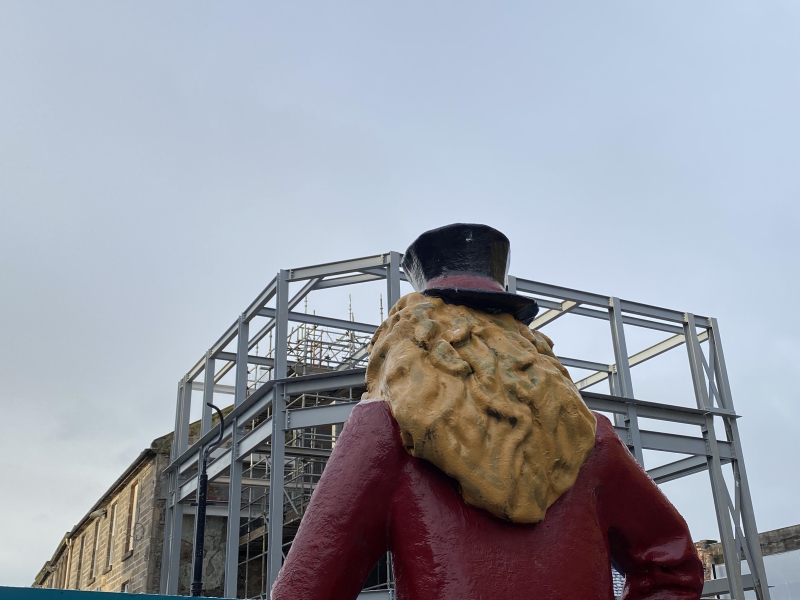Elgin’s Dandy Lion has not had a view up the High Street to Dr Gray’s Hospital since May 2018.
In the meantime, his view has been blocked by wooden hoardings as Poundland first had structural problems and then a fire. We’ve had piles of metal on the site, from the “scaffolding mountain” to the beginnings of the new Poundland construction. In the various photos below, there is a similarity but there’s also gradual progress.

In the law relating to bereavement compensation in Scotland, there can be a superficial sameness to things but, again, under the surface, there is progress and milestones are being achieved. We’ll look at one of these progression points in this article.

For fatal accident claims, in Scotland, this is one area where the law is quite different to that in England and Wales.
This is particularly the case for compensation awarded for the grief and sorrow caused by deceased’s death – often referred to as compensation for “loss of society”.
Those pushing for reforms in England and Wales often point to the Scots Law rules (described as more “modern and compassionate”) in this area as a better and fairer one than they have down south at present.
Compensation levels are generally much higher in this area of law in Scotland.
In Scotland, compensation levels for fatal accident claims by relatives of people who have died as a result of needless injury began to increase in the early part of this century.
Primarily, this was due to the influence of awards made by juries.
Juries’ valuations highlighted the fact that compensation assessed by judges was out of touch with public opinion, as too low, on average.
This led to a period of time where, in fatal – or a potentially high value – claims, the personal injury solicitor’s advice to their client was to try to progress their claim towards a jury trial.
There was never a guarantee that the court would agree that the case was suitable for trial by jury.
It was a form of civil court hearing only available in the highest civil court in Scotland, the Court of Session. And it was also a potentially risky course because sometimes a jury would do the “unexpected” and award a claimant a lot less than they might have expected to get had the value of the claim been assessed by a judge. Judges might have been stingier, on the whole, but at least their awards were more predictable.
In recent years, the trend in this area of the law in Scotland has been for judges to take account of the levels of compensation which juries were awarding for “loss of society”.
It may be that we are reaching the point where we have practically an equalisation in the assessment of compensation as between judges and juries in the area of fatal accident compensation awards.
That’s a possible conclusion from the case of Paterson –v- Lanarkshire Health Board, in which the decision was issued in January 2023.
In that case, the Court of Session judge valued the deceased’s mother’s claim for loss of society at £100,000. It is the highest level of compensation ever awarded to a parent for loss of society. Previous highest awards were of £80,000 to a mother in a 2014 case and of the same amount to a father in a case decided in 2015.
It’s important to remember that the court will assess each individual claim by a relative on its own merits.
The court looks at the nature and quality of the relationship between the claimant and the deceased. In other words, just because you are the parent or child or other close relative of the deceased, it does not automatically entitle you to a certain level of compensation.
On the other hand, the value assessed for the parent’s claim by the judge in Paterson highlights that any perceived difference between judge-based and jury-based awards has all but disappeared. Given that judges tend to provide a significantly more predictable outcome on claim valuation than juries, the attraction of jury trials for claimants in the area of bereavement damages in Scotland is not likely to see an increase any time soon.
How we can help
We hope you have found this article – about the continued evolution of Scots Law in the field of compensation claims irisng from the death of a relative – to be helpful.
If you have any questions at all, please contact us. You can call either of our accredited specialist personal injury solicitors – Marie Morrison and Peter Brash – on 01343 544077 or send us a Free Online Enquiry.
All initial enquiries are without obligation and free of charge.
Make A Free Online Enquiry Now
